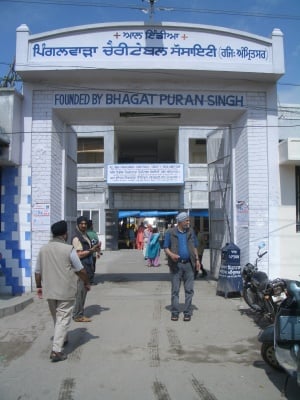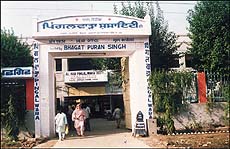Pingalwara
From SikhiWiki
Pingalwara was the name given to a humble house for the destitute in Amritsar in northern Indian state of Punjab. In the early 1900's, it was an original idea of the founder, Bhagat Puran Singh to cater to the needs of people who had been rejected by society. It was an ad-hoc facility for the disabled; the mentally ill; the dispossessed; generally for people who were no longer accepted by anyone in society. Bhagat Puran Singh built this institute literally single-handed with the ideals of his mother as his driving force; the message of Gurbani as a beacon and the generosity of the Punjabi society as his safety net and hunting ground.
- Main article: Bhagat Puran Singh
He begged; worked as hard as he physically and mentally could; resorted to whatever options were available to care and provide for his "patients" just like a father or mother would care and provide for his children. No barrier or hurdle could stop him in his effort to care for these "community rejects". He left no stone unturned to bring some dignity to the lives of individuals who had no one in this world except this saint. He brought hope and respect to these people who have been rejected by their families and friends because of their terrible disabilities.
|
Today, the Pingalwara complex is housed in a three storey building near the main Amritsar bus stand on the National Highway no. 1, also known as G.T. or Grand Trunk Road. Currently Pingalwara has facilities for 400 "patients" who are fed, housed and looked after thanks to generous support of various philanthropists. The unclaimed bodies of the deceased are donated to Government Medical College, Amritsar for research and teaching purposes. Pingalwara is officially registered as All India Pingalwara Charitable Society. Since the death of its founder, Bhagat Puran Singh in 1992, it is headed by Mrs Inderjit Kaur who is a physician by training and also runs a private maternity clinic in Amritsar.
Pingalwara also operates a free drug dispensary, a blood bank, a shelter for intellectually disabled children and a free primary school in a slum area in Amritsar city. Poor and abandoned children raised by Pingalwara are helped to re-establish themselves in society at completion of their school education. An ambulance and a basic operation room is available for trauma care of accident victims.
Introduction
Bhagat Puran Singh, a devout Sikh, realised and stated that the nations' strength was not to be found in its treasury statement. Instead, the it lies in the character of its people, in their willingness to sacrifice leisure, comfort and a share of their talents for the welfare of others less fortunate than themselves. In other words, the might of the nation is determined by looking at how it treats its weakest citizens.
The organisation states that the family is the basic unit of our society, it is there that the responsibility for the care and provision of the individual begins. Today with the materialistic outlook which our society has acquired, the family ties are under a lot of stress and strain. The family as a cohesive unit is breaking up. A family is no longer a group whose members depend upon each other for companionship, support, love and affection. The urge of each individual to pamper his own wants has placed emphasis on selfishness and the tradition of self-sacrifice has diminished.
Every society has its share of its unfortunate individuals who are sick, disabled, forlorn, suffering and deserted by mankind. In most societies, there are old people and new born babies who no one wants to look after - even their biological parents - for whatever reasons. In many poor nation and even in "rich" countries, there are disabled individuals who are not admitted into any of the hospitals and are left to die on the roadside or without proper care and treatment. There are diseased persons no one wants to touch. They are all considered "a burden of our society" and no one wants to look after them. So who will look after them?
95 years ago, a messiah named Ramji Das who later became Bhagat Puran Singh, came into this world. He started a movement which was totally new in conception. This was no easy task. For fourteen long years he carried a crippled child who was mentally handi-capped on his shoulders as they had no place to stay. At another time he cared for a mother Asha Devi nearing death from TB and her child who would later fall to the disease as well. This was a period of his baptism. He achieved godliness through his love for fellow human beings.
The journey was arduous and painful. But single handed, toiling day and night, in scorching heat and biting cold, in rains and thunderstorms, undeterred by adversaries, undaunted by criticism, he continued to pick up these wretched, dying, dirty, infectious creations of God from wherever they could be found.
Pingalwara is not an institution, it is a dynamic movement. Bhagat Ji did not lay down a number of pre-determined tasks: he propounded a philosophy which is the foundation of Pingalwara and covers the entire spectrum of social problems of our society.
Philosophy
Task of Pingalwara has been clearly laid down by Bhagat Puran Singh Ji. He had studied these 'problems' of society at close hand and lived very close to them. This resulted in a dynamic movement in the form of Pingalwara.
Medico Social Problems
Moral Responsibility: Every sick person who is physically unfit to earn his livelihood has the divine right to be looked after through men and organisations working in the field of social service and charity.
Lack of Indoor facilities: In our society there are a large number of poor, helpless and sick people who cannot obtain admission into any of the hospitals for reasons of affordability, etc. At best the hospitals can diagnose the disease and in a few cases provide medical treatment in their outdoor. Therefore, we need institutions where the patients can be looked after and for treatment can be taken to various hospitals in the city.
Non Availability of medicines: Most of the poor patients who can get their disease diagnosed from the hospitals are unable to purchase the required medicines.
Incurable Diseases: No hospital admits persons with incurable diseases. They are left on the road side to die a slow, painful and lingering death. In this state they are a big blotch on the face of our society.
Mental Patients| There is acute shortage of beds in Mental Hospitals. Against 50 lac (5 million) mental patients, there are only 22,000 beds available in the whole country.
These patients have specific problems because of the nature of the disease and are given below :-
They need close attention, especially the violent patients.
They need escorts which some of the families cannot provide. This has resulted in many patients to be chained to a post for many years.
Their recovery time can be very long, many poor families can not afford it.
Women mental patients are specially vulnerable to venereal diseases (many are often raped) if not looked after properly and thus one source alone can transmit such diseases to hundreds of people. Already India is having the largest number of HIV cases in the world.
Mental patients and lunatics besides being an economic burden on the society can also endanger people's lives and property.
Pingalwara aims at overcoming these shortcomings and help in the formation of a healthy and humane society.



No comments:
Post a Comment